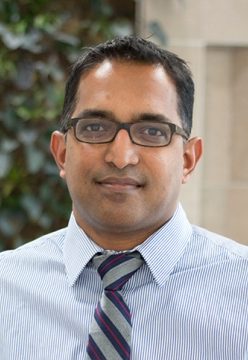Measured Changemaker: How Dr. Teddy Samy Envisions a World With More Opportunity.
Most high school students spend a lot of time learning about a university before selecting it. This wasn’t the case for Dr. Yiagadeesen "Teddy" Samy.
"I obtained a fully-funded scholarship under the Programme canadien de bourses de la Francophonie (PCBF) and they chose where I would study", explains Dr. Samy. "So that’s how I ended up at Glendon, a place I had never heard of before."

What he had heard of before was economics, and he was intent on studying it at university after studying it in high school in Mauritius. Upon the advice of an influential Glendon professor, Brian Bixley, who was head of the Economics Department at the time, he added a major in mathematics to his program of study.
In addition to the guidance of Professor Bixley, Dr. Samy cites the influence of Professors Xavier de Vanssay, Ian McDonald, and David Spring.
"I had excellent professors during my time at Glendon,” he says. “Both Professors McDonald and de Vanssay encouraged me to continue my graduate studies in economics. The late Professor McDonald, for those who had the privilege to be in his classes, was a real inspiration, a dedicated teacher who cared about his students very deeply."
This support from experienced academics served Dr. Samy well as he pursued Economics at the graduate level. He earned a Master’s degree in Economics from the University of Toronto and moved on to obtain a PhD in Economics from the University of Ottawa. Today, he is the Director and Full Professor of International Affairs (NPSIA) at Carleton University.
Over his two decades in academia, which included brief periods of work in banking and marketing, Dr. Samy has witnessed the ups and downs of discourse on economics and international trade. Notably, his time at Glendon overlapped with the signing of NAFTA and the heightened debate around free trade.
Over two decades later, NAFTA has re-entered the public discourse in a dramatic fashion, but Samy has noticed a shift in the way we discuss economic issues today.
"The recent backlash against trade and globalization is in my view quite alarming,” he says. “We must do a better job educating people about the benefits of free trade and open markets, while making sure that those who lose from free trade are taken care of."
How exactly does Dr. Samy believe those disadvantaged by free trade will be taken care of? He believes that governments must take issues of income inequality and redistribution more seriously. He is optimistic that technological advances and trade openness, which he explains are "mutually reinforcing", will enable more countries to participate in the global economy.
Dr. Samy’s experience in the worlds of both public policy and academia has supplied him with valuable wisdom for students wishing to pursue a similar career path. University is when people feel incredibly hopeful about what they can accomplish with the material they have learned, but post-grad roadblocks in the form of bureaucracy, institutional limitations, and office politics can dampen that enthusiasm. He offers the following advice for students debating how best to approach their career after graduation.
"I truly believe that people should find something that they enjoy doing. Even if you don’t end up exactly where you want, at least you’ll enjoy the journey. If it’s a career in international development, in public policy, or international affairs more broadly, develop the skills that will help you to get there. These include communication and languages, working cross-culturally, critical thinking, acquiring solid foundations in economics and data analysis, to name a few. And be patient. It takes time to effect change."
And in true economist fashion, Dr. Teddy Samy has one caveat: "I would say you must also choose something that’s in high demand!"

